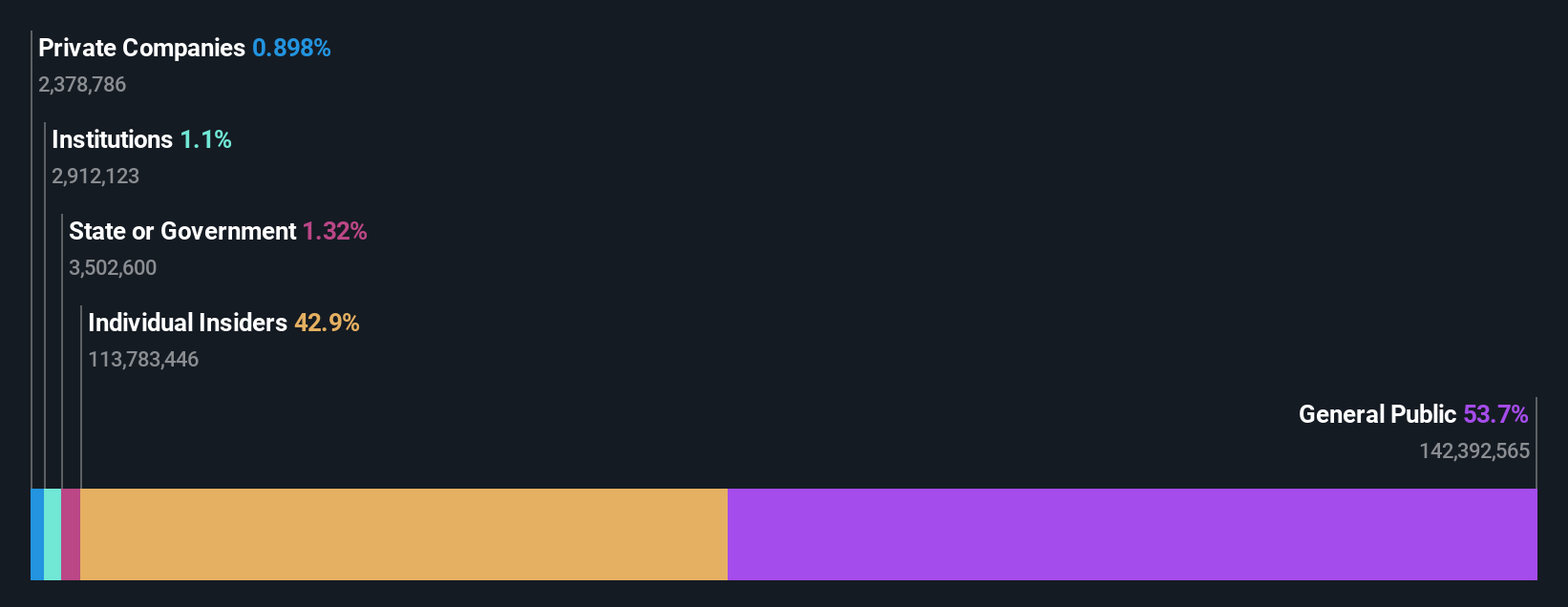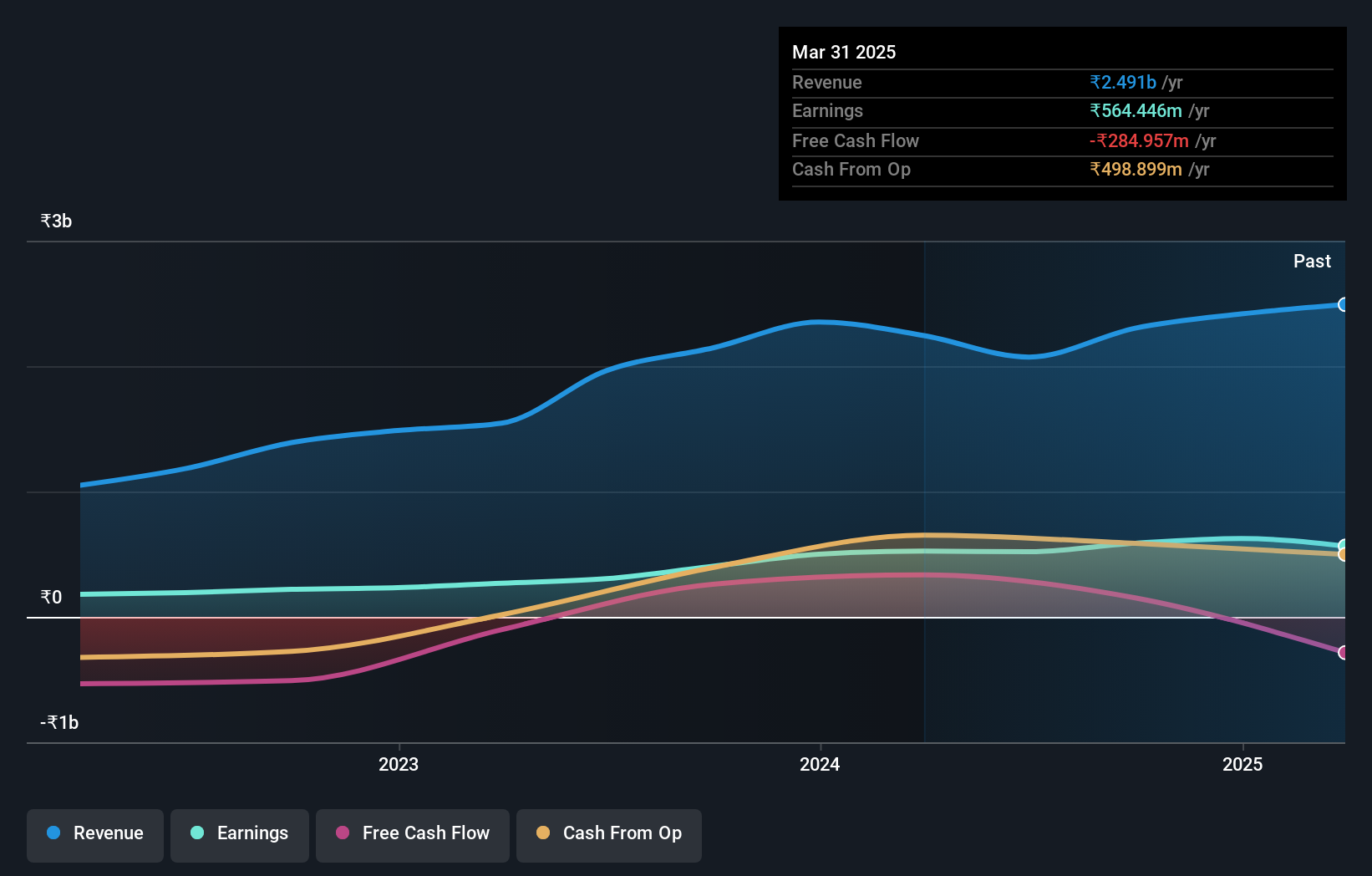- India
- /
- Communications
- /
- NSEI:AVANTEL
Retail investors invested in Avantel Limited (NSE:AVANTEL) copped the brunt of last week's ₹4.0b market cap decline
Key Insights
- Significant control over Avantel by retail investors implies that the general public has more power to influence management and governance-related decisions
- 45% of the business is held by the top 25 shareholders
- Insiders have sold recently
To get a sense of who is truly in control of Avantel Limited (NSE:AVANTEL), it is important to understand the ownership structure of the business. With 54% stake, retail investors possess the maximum shares in the company. In other words, the group stands to gain the most (or lose the most) from their investment into the company.
While the holdings of retail investors took a hit after last week’s 10% price drop, insiders with their 43% also suffered.
In the chart below, we zoom in on the different ownership groups of Avantel.
View our latest analysis for Avantel

What Does The Institutional Ownership Tell Us About Avantel?
Institutional investors commonly compare their own returns to the returns of a commonly followed index. So they generally do consider buying larger companies that are included in the relevant benchmark index.
Institutions have a very small stake in Avantel. That indicates that the company is on the radar of some funds, but it isn't particularly popular with professional investors at the moment. If the company is growing earnings, that may indicate that it is just beginning to catch the attention of these deep-pocketed investors. It is not uncommon to see a big share price rise if multiple institutional investors are trying to buy into a stock at the same time. So check out the historic earnings trajectory, below, but keep in mind it's the future that counts most.

Avantel is not owned by hedge funds. With a 17% stake, CEO Abburi Vidyasagar is the largest shareholder. Abburi Sagar is the second largest shareholder owning 7.6% of common stock, and A. Sailaja holds about 6.2% of the company stock. Interestingly, the second-largest shareholder, Abburi Sagar is also Senior Key Executive, again, pointing towards strong insider ownership amongst the company's top shareholders.
On studying our ownership data, we found that 25 of the top shareholders collectively own less than 50% of the share register, implying that no single individual has a majority interest.
While studying institutional ownership for a company can add value to your research, it is also a good practice to research analyst recommendations to get a deeper understand of a stock's expected performance. We're not picking up on any analyst coverage of the stock at the moment, so the company is unlikely to be widely held.
Insider Ownership Of Avantel
The definition of company insiders can be subjective and does vary between jurisdictions. Our data reflects individual insiders, capturing board members at the very least. Management ultimately answers to the board. However, it is not uncommon for managers to be executive board members, especially if they are a founder or the CEO.
I generally consider insider ownership to be a good thing. However, on some occasions it makes it more difficult for other shareholders to hold the board accountable for decisions.
Our most recent data indicates that insiders own a reasonable proportion of Avantel Limited. Insiders own ₹15b worth of shares in the ₹36b company. We would say this shows alignment with shareholders, but it is worth noting that the company is still quite small; some insiders may have founded the business. You can click here to see if those insiders have been buying or selling.
General Public Ownership
The general public, mostly comprising of individual investors, collectively holds 54% of Avantel shares. This level of ownership gives investors from the wider public some power to sway key policy decisions such as board composition, executive compensation, and the dividend payout ratio.
Next Steps:
It's always worth thinking about the different groups who own shares in a company. But to understand Avantel better, we need to consider many other factors. Like risks, for instance. Every company has them, and we've spotted 3 warning signs for Avantel (of which 2 shouldn't be ignored!) you should know about.
If you would prefer check out another company -- one with potentially superior financials -- then do not miss this free list of interesting companies, backed by strong financial data.
NB: Figures in this article are calculated using data from the last twelve months, which refer to the 12-month period ending on the last date of the month the financial statement is dated. This may not be consistent with full year annual report figures.
New: Manage All Your Stock Portfolios in One Place
We've created the ultimate portfolio companion for stock investors, and it's free.
• Connect an unlimited number of Portfolios and see your total in one currency
• Be alerted to new Warning Signs or Risks via email or mobile
• Track the Fair Value of your stocks
Have feedback on this article? Concerned about the content? Get in touch with us directly. Alternatively, email editorial-team (at) simplywallst.com.
This article by Simply Wall St is general in nature. We provide commentary based on historical data and analyst forecasts only using an unbiased methodology and our articles are not intended to be financial advice. It does not constitute a recommendation to buy or sell any stock, and does not take account of your objectives, or your financial situation. We aim to bring you long-term focused analysis driven by fundamental data. Note that our analysis may not factor in the latest price-sensitive company announcements or qualitative material. Simply Wall St has no position in any stocks mentioned.
About NSEI:AVANTEL
Avantel
Designs, develops, manufactures and sells wireless communication products in India.
Excellent balance sheet with low risk.
Market Insights
Community Narratives



